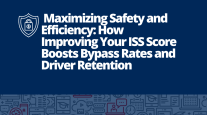USDA Seeks Massive Fee on Truck-Borne Imports
This story appears in the May 12 print edition of Transport Topics.
The U.S. Agriculture Department has proposed recouping costs associated with animal and plant inspections by raising fees for all truck-borne imports by 205%.
The proposed rule would set the fee for using a truck transponder at $320 a year, up from the current $105. The price of a one-time, border-crossing fee into the United States from Canada or Mexico would increase by 52.4%, to $8 from $5.25.
The proposed rule was published officially by Agriculture’s Animal and Plant Health Inspection Service on April 25, with the agency saying it needs to increase rates that were last changed in the fall of 2009.
“We have determined that . . . revised user fees are necessary to recover the costs of the current level of activity, to account for actual and projected increases in the cost of doing business and to more accurately align fees with the cost associated with each fee service,” APHIS said in the proposal.
A U.S. Customs and Border Protection fee that is paired with the Agriculture transponder fee is not mentioned in the proposal and would remain at $100 a year.
Truckers expressed disappointment with the size of the proposed increase.
“We agree that it is within the purview of the Agriculture Department to protect citizens from infiltration by pests at the borders, but this rate increase seems rather exorbitant,” said Joe Weigel, a spokesman for Indianapolis-based Celadon Trucking Services, a truckload carrier that handles a lot of cross-border shipping. The company mainly hauls manufactured and consumer goods, Weigel said, although Celadon’s smaller reefer fleet does transport some food.
“We don’t see why this should be aimed at all trucks rather than those in the [agricultural] sector,” he said.
The proposal also sets fees for inspections of aircraft, marine vessels, railroads and automobiles.
“This proposed rule is a serious issue because it’s such a large increment,” said Martin Rojas, an American Trucking Associations vice president. “We don’t oppose increases as long as the fees are dedicated to the purpose for which they are intended — actual inspections and their improvement.”
Rojas said ATA will file comments with APHIS to oppose truck fees.
“This proposal would generate a big, huge chunk of money, and not all of it would be spent on items specifically related to inspections,” he said.
Truckers in Canada also balked at the rule.
“The proposed increases are ludicrous,” said David Bradley, president of the Canadian Trucking Alliance.
“The United States, like Canada, has every right to protect its agricultural sector,” Bradley said. “But setting astronomical fee increases without consideration of the impact on other industries — or without seeking ways to more effectively and efficiently deploy its resources through risk assessment as opposed to inspecting every truck whether it is hauling agricultural products or not — is completely untoward,” Bradley said.
The proposal said the agency spent $73.5 million on truck inspections in fiscal 2011, and officials expect that to rise to $82.6 million in fiscal 2016.
The number of APHIS truck inspections was 10.7 million in fiscal 2012. Truck inspections are projected to rise to 12.4 million in fiscal 2016. Therefore, in fiscal 2016 the average cost of a truck inspection would be $6.66.
As for the two types of truck fees, an annual transponder amount versus a single inspection, APHIS officials said they want the transponder fee to be 40 times as large as a single inspection: $320 compared with $8.
That would still leave a large incentive in place for frequent border crossers. APHIS said it will accept comment through June 24.


